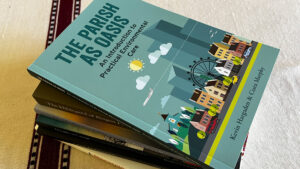The ‘normalcy’ of homelessness

KEVIN HARGADEN :: There are many in the Irish church who are very concerned about the secularising trends in our society. They worry what will come next, fearing that without widely shared moral values, the very integrity of our society will be weakened.
One would think that in such a setting, it would be the best of good news to hear a powerful government official quote the words of Jesus as a means to address a pressing social crisis. This is exactly what happened earlier this week, as Dr. Conor Skehan, Chair of the Housing Agency, quoted “the man from Nazareth.” In response to the homelessness crisis, he counselled the listeners of Monday’s Morning Ireland programme that “the poor you will always have with you.” This supported his contention that while homelessness is to be lamented, it is also “normal.” This echoes his comments made last month, which have been taken up by leaders in the government, that Irish homelessness rates were “completely normal” in the context of our European partners.
The talking heads whose prominent newspaper columns are rarely slow to lament the scourge of secularism and the destructive potential of rampant liberalism are likely to let these comments pass them by. Those who sense that the Irish church faces hostility everywhere she looks will not necessarily make the connection between Dr. Skehan’s comments, Leo Varadkar’s comments, Damien English’s comments, and Eileen Gleeson’s comments, but if they had eyes to see they would be more distressed about this rhetoric than by the sorts of scandals that seem to successfully agitate Christians.
Thinking in this light, we come to see the recent spate of harsh language around homelessness for what it really is: the genuine expression of a dangerous trend in our society. This is something Christians should be furious about. The claim that homelessness can be “normal” ought to strike us an offensive attack on language, never mind a disguise for the worst kind of social callousness. If we had our wits about us, the ease with which our public discourse slips into this key should be more theologically troubling than many of the stories which aggravate Christian opinion.
To even comprehend the claims made by Mr. Varadkar and Dr. Skehan, we must first imaginatively step away from the reality of the 6-year-old living in a B&B or the 23-year-old finding shelter in a tent by the canal. In place of that fleshy, embodied reality, we are being asked to embrace an abstraction, a statistical table that numerically reconfigures the shivering skin as a static concept. The shift from the hard facticity of a suffering human being to its numerical shadow is presented as dispassionate and rational. We can imagine the supporters of such speech thinking themselves bravely realistic because they have the courage to push the emotions away and just deal with the policy issues. They are sorely mistaken.
This cognitive pilgrimage is required of us each time we tolerate this econometric assessment of reality. Christians insist that the world is charged with the grandeur of God. There is no square inch of creation that is not loaded with ethical significance. The imaginative leap that frames 8,300 human beings without a home as normal entails a view of the universe that Christians must utterly reject. The social problems we face have moral weight. They are not amoral puzzles. The truth of homelessness is not primarily to be found in Eurostat figures, but in the bodies of people who have names and parents and favourite songs and cold feet and treasured memories. This is destructive secularisation at play; when created beings get replaced by fabricated figures, and this is passed off as “reason”.
Dr. Skehan quoted the words of Jesus – who himself was homeless and lived off charity hand-outs – and butchered them. The poor you will always have with you is a quotation from Deuteronomy 15:11. It is a call “to be open-handed towards your fellow Israelites who are poor and needy in your land.” It is not an invitation to settle for a “normal” amount of suffering, but an injunction to intervene in each and every instance. It should be noted that Jesus’ words come after a woman anoints him with expensive perfume in Bethany. Judas questions the economic waste of this indulgence. The calculating temptation to rationalise and economise is not new. It might be worthwhile for Christian leaders to ponder why the contemporary church can be so slow in recognising it?
“Normalcy” is not, then, a category that can be applied to homelessness. It can only be applied to second-order discussions about homelessness. These important leaders seem blind to the fact that they are not talking about the thing itself when they utter these cold, clinical, crooked reassurances. The thing itself when we talk about homelessness is, after all, not a thing, but a person. It is not normal for a person to have no place to call home. Any efforts to obscure this fundamental moral truth should righteously infuriate us.



 Kevin Hargaden leads the Jesuit Centre for Faith and Justice, where he works as a Social Theologian. Originally from Kildare, he is an elder at Lucan Presbyterian Church in Ireland.
Kevin Hargaden leads the Jesuit Centre for Faith and Justice, where he works as a Social Theologian. Originally from Kildare, he is an elder at Lucan Presbyterian Church in Ireland.


























